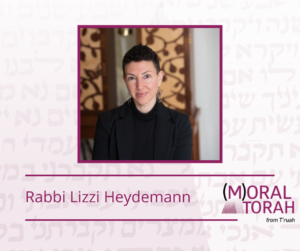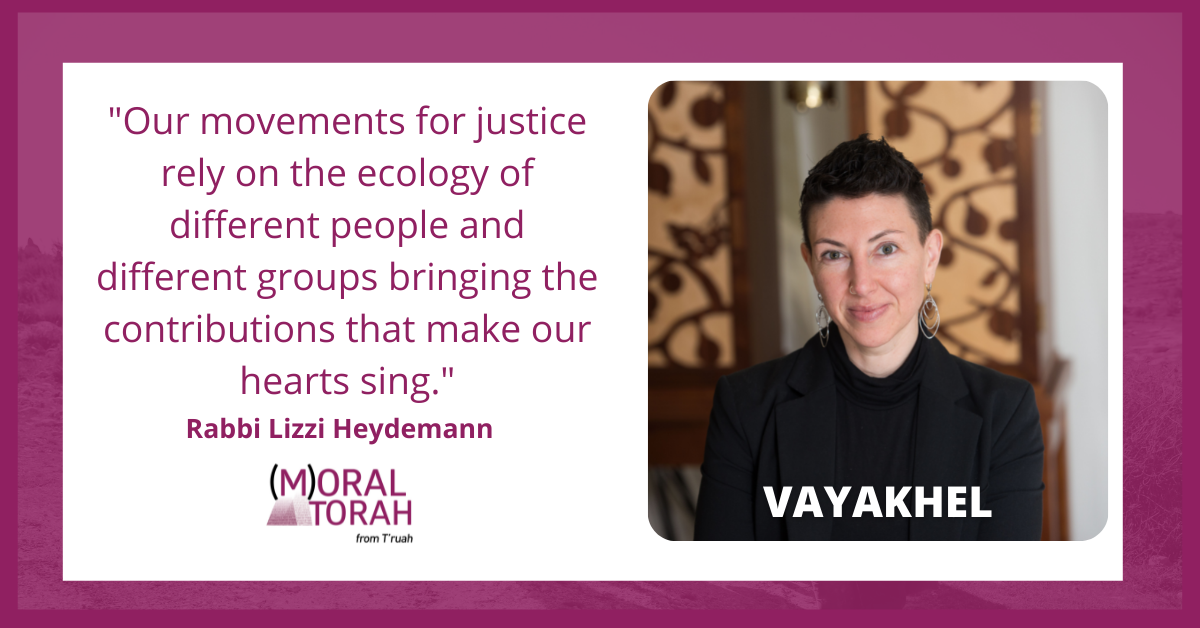A D’var Torah For Parshat Vayakhel by Rabbi Lizzi Heydemann
From 2016 through 2020, there were a lot of social justice marches in Chicago, a few of which took place on Saturdays. This always put me, and most Jews I knew, in a hard place. On the one hand, we wanted to support women, Muslims, immigrants, LGBTQ people — whomever’s rights or safety were being threatened.
But on the other hand, Shabbat is our day of rest, the one day we try to disengage from the struggles of the world. It can be hard to sink deeply into rich, restful Shabbat heartspace while loading up with water, poster board, markers, the baby carrier, and granola bars in a mom bag to catch the train downtown to march and shout at the top of our lungs.
Let me say: For many Jews, what I just described sounds like a perfectly meaningful, not to mention Jewish, way to spend Shabbat. Others wouldn’t march in a rally on Shabbat (or any other day, for that matter), but they’d happily send money to support the cause, gladly call legislators, or serve up a big hot meal to their friends coming home after the protest.
Sign up to receive (M)oral Torah in your inbox each week.
Anyone involved in social justice work has at one point or another wondered if what they’re doing is enough, or is the right thing to do, especially when one looks around and sees how many powerful, inspired people are doing other things. How can a person know what to contribute to a movement, and whether it’s sufficient?
Parshat Vayakhel – “he convened” – describes Moses giving direction to the Israelites answering the question: How do you find your place in a movement? Moses is talking about the particular community project of building the Mishkan, but these verses also can give us insight into movement building writ large.
Moses convened the whole Israelite community and said to them: here is what God commanded — bring gifts to God from everyone whose heart moves them. Gifts for God: gold, silver, copper, blue, purple, crimson yarns, fine linen, goat’s hair, tanned ram skins, dolphin skins, acacia wood, oil for lighting, spices for the anointing oil and for the aromatic incense, lapis lazuli and other stones for setting, for the ephod and breast piece. And let all among you who are skilled come and make all that God has commanded… (Exodus 35: 4-10)
After this list of materials is the list of things to be made with them: the Tabernacle, the tent, its covering, the menorah, the incense holder, the clasps and the planks, the utensils, the bars, the posts, the sockets, the ark, the poles, the curtain, the table, and a few more things. Oh, also the clothes the priests need to wear for the sacrificial services. It’s an impressive list.
Find more commentaries on Vayakhel.
Listing all the things that need to be done impresses upon the listener that no one person could possibly do everything — there’s simply too much. Not even a Mishkan-building overachiever could imagine that they alone could be responsible for bringing and creating all of these materials and implements in the service of the movement. Thus, this lifts the burden off the person wanting to help and wondering if what they’re doing is right, or is enough, and reframes the project as a collective endeavor: You cannot do it all, so do what makes your heart sing. The movement needs people whose hearts are moved, the Torah says. That’s what will bring God’s presence down and help it dwell among us. That’s what creates a movement that’s not just functional but deeply humane and fundamentally sacred.
Any living organism contains cells that perform different functions; when they do their jobs with integrity, the whole organism thrives. Our movements for justice rely on the ecology of different people and different groups bringing the contributions that make our hearts sing. We need the person whose Judaism motivates them to observe a traditional Shabbat in shul, and then walk in their tallis from one part of the city to the other to stand in solidarity. We need the people who show up with water, signs, and snacks to distribute to protesters. We need the organizers behind the scenes forging coalitions that will extend before and beyond any particular rally or march. We need the artists and musicians and singers and theater-makers, bringing a much-needed joy and levity to justice spaces. We need the people who don’t necessarily show up in body, but show up with financial support to fund the efforts of those whose contribution will primarily be time and expertise. We need the people with the savvy to lobby, to write legislation, and to change policy at high levels.  We need rabbis, too, to provide support and inspiration to people who have a sense that they should show up as Jews, but not necessarily why.
We need rabbis, too, to provide support and inspiration to people who have a sense that they should show up as Jews, but not necessarily why.
So pick the thing that moves your heart. Do that. Let someone else do the thing that moves theirs. Together, we’ll build the Mishkan. Together, we’ll build strong and inspired movements for change.
Rabbi Lizzi Heydemann is the founder and senior rabbi of Mishkan Chicago, an independent post-denominational spiritual community breathing new life into Judaism by helping people find deeper senses of purpose, connection, and inspiration. She is on the executive board of T’ruah.

